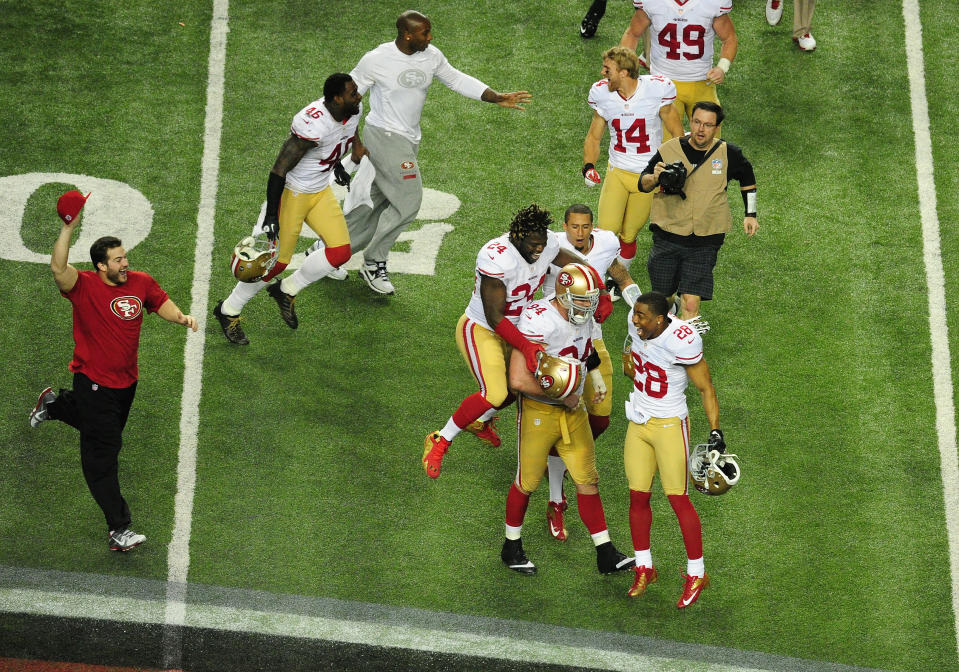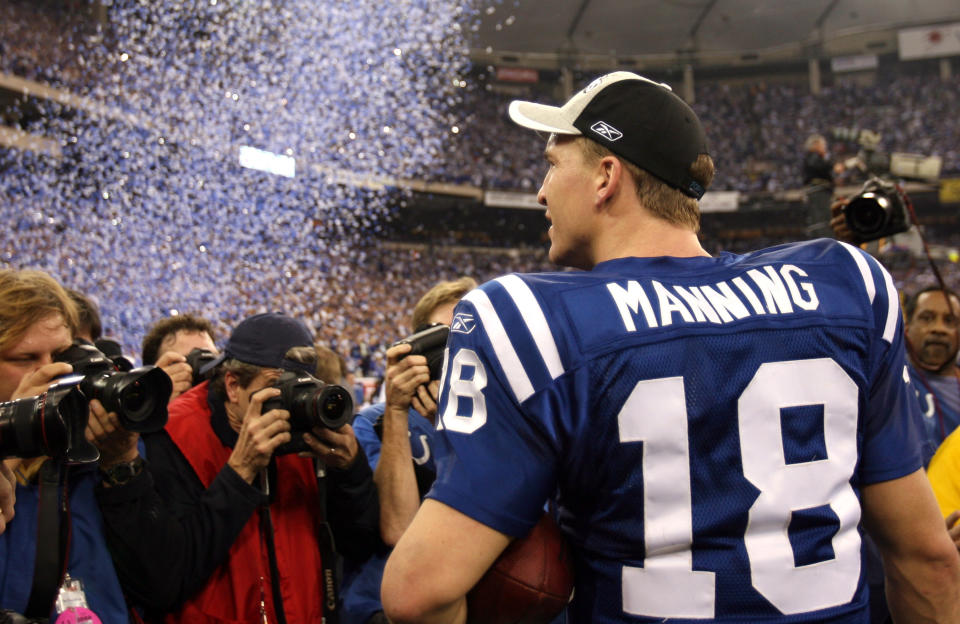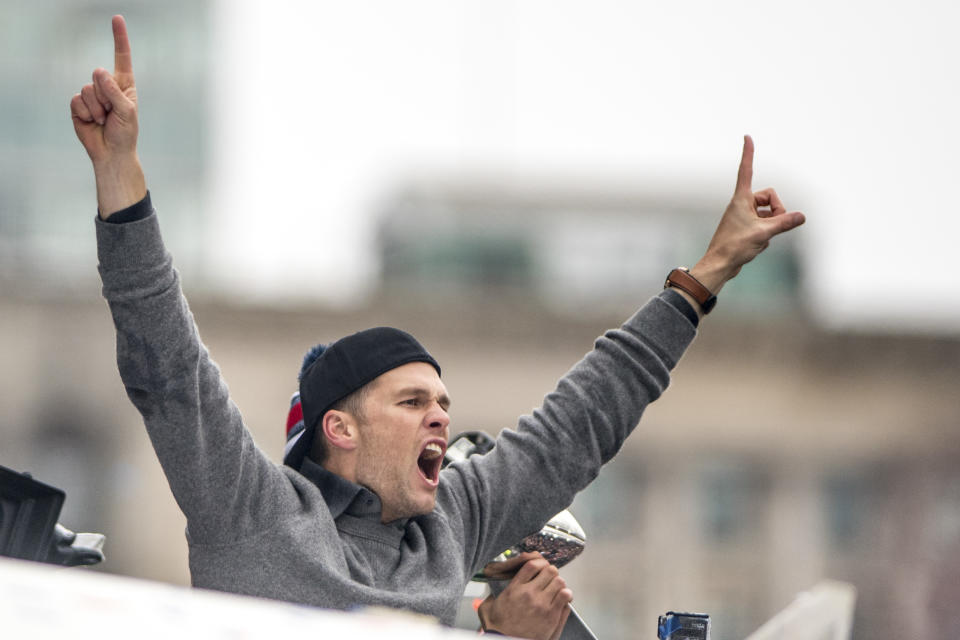Chiefs' insane revival against Texans joins list of biggest postseason comebacks ever
Playoff comebacks come in all shapes and sizes. Some are desperate, last-minute affairs. Others come with teams progressively chipping away at a seemingly insurmountable lead.
And then there’s what went down Sunday at Arrowhead Stadium.
Falling behind 24-zip in the second quarter at home, the Kansas City Chiefs went on a run that was difficult to comprehend when it was happening — and even tougher to place in historical terms.
It was the biggest comeback, playoffs or otherwise, in Chiefs history. Likewise, it was the biggest blown lead in Texans history. And the comeback really happened in the first half. By game’s end, it strangely didn’t feel like that competitive a game for some of the second half.
But with that in mind, we wanted to see where it fit with the biggest playoff comebacks ever. Because a 24-point deficit is still tied for the third-biggest postseason deficit ever overcome.
Here is our list of the NFL’s 10 best postseason comebacks in the Super Bowl era.
2012 NFC title game: San Francisco 49ers 28, Atlanta Falcons 24 (17 points)
The Falcons raced to a 17-0 lead at home against the 49ers and looked to be in control until Colin Kaepernick and Frank Gore took over.
The 49ers scored twice in the first half to make it a field-goal game, but the Falcons countered with a Tony Gonzalez TD and led by 10 at halftime. That’s when Kaepernick and the 49ers’ run game heated up and chipped away.

Gore scored twice in the second half to take the lead, but the 49ers’ defense had to hang on for one final red-zone stop with the Falcons running five plays inside the 20-yard line in the final three-plus minutes but unable to score. Gonzalez wasn’t targeted in the final 12 minutes of the game.
At the time, it was the biggest comeback victory in an NFC championship game.
1972 NFC divisional game: Dallas Cowboys 30, 49ers 28 (18 points)
For three quarters, Cowboys QB Roger Staubach — out since Week 5 with a separated shoulder — sat and watched as replacement Craig Morton struggled badly for a Cowboys team that would turn the ball over five times and fall behind 21-3 in the first half and 28-13 entering the fourth quarter.
But Staubach, nicknamed “Captain Comeback,” would have the last say. He came in to complete 12-of-20 passes for 174 yards and two touchdowns in the fourth quarter alone and lead a stunning comeback. Staubach’s third TD drive of the quarter was the game-winner, as he hit Ron Sellers with 52 seconds to play to cap the 15-point rally with 10 minutes remaining.
2019 NFC divisional game: Chiefs 51, Texans 31 (24 points)
They became the first playoff team to trail by 20 or more points and win by 20 or more.
It felt like two different games.
The problem for the Texans? The “first game” only lasted about a quarter.
1985 AFC divisional game: Miami Dolphins 24, Cleveland Browns 21 (18 points)
Earnest Byner fueled an incredible first-half performance by the Browns, building a 21-3 lead in Marty Schottenheimer’s first season and playoff game with the Browns. It was also rookie QB Bernie Kosar’s return to the Orange Bowl, where he had led the Miami (Fla.) Hurricanes to a college national championship.
The 8-8 Browns were 10.5-point underdogs in Miami, and yet it appeared the 12-4 Dolphins — who hadn’t lost at home in more than a year — had no answer for Byner and a Browns run game that totaled 251 yards on the ground. Byner scored two touchdowns, including a 66-yard rumbler in the third quarter to make it an 18-point lead.
But the Dolphins had Dan Marino. The rocket-armed QB was 12-of-24 passing for 111 yards in the first half with a pick, but he ended up leading three second-half TD drives to take back the lead and break Cleveland’s hearts. Kosar, meanwhile, struggled badly: 10-of-19 passing for 66 yards for the game.
NFC wild-card game: 49ers 39, New York Giants 38 (24 points)
This game was bananas from start to finish. After Terrell Owens gave the 49ers a 7-0 lead early, the Giants stormed back to take a 38-14 lead with just over four minutes left in the third quarter. Amani Toomer scored three times, and Tiki Barber and Jeremy Shockey each added scores, as Kerry Collins was having the game of his life following a first-quarter pick.
But Jeff Garcia and Owens led the comeback with two TDs and two two-point conversions late in the third and early in the fourth quarter as the comeback was on. The Giants’ Matt Bryant missed a field goal attempt (with the first of two sub-par snaps from new snapper Trey Junkin) with just over three minutes left that would have made it an eight-point game. Garcia came back and hit Tai Streets with one minute left in regulation to take the one-point lead.
The Giants still had a chance, lining up for what could have been a a game-winning kick. Junkin’s snap back to holder Matt Allen was off again, and Allen uncorked a wild throw downfield to ... offensive lineman Rich Seubert. To this day, many Giants fans insist he was blatantly interfered with (and he was), but there was a different penalty call — on Seubert (illegal man downfield, which appeared to be incorrect).
After the questionable call (and non-call) going in their favor, the 49ers’ mind-blowing comeback was complete.
AFC title game: Indianapolis Colts 38, New England Patriots 34 (18 points)
When Asante Samuel picked off Peyton Manning and ran it back for a touchdown and a 21-3 Patriots lead, it looked like New England would remain Manning’s nightmare. But the Colts kept chipping away at the lead, tying the contest three separate times in the second half in one of the strangest, most memorable games in recent playoff annals.

Manning took over down 34-31 with 2:17 remaining in what clearly can be called one of the defining drives of his vaunted career. Hitting Bryan Fletcher for 32 yards and Reggie Wayne — on a ball he almost bobbled away to the Patriots for a turnover — for 14 more, the Colts were in business in the final minute.
Joseph Addai scored the go-ahead touchdown (did the Patriots let him score?), and Marlin Jackson picked off Tom Brady to preserve the epic victory. Two weeks later, the Colts would win the Super Bowl.
2014 NFC title game: Seattle Seahawks 28, Green Bay Packers 22 (16 points)
Trailing 16-0 at halftime and 19-7 with just over two minutes remaining, the Seahawks’ dream season appeared over.
But a struggling Russell Wilson (four interceptions) willed Seattle to a touchdown drive to cut the lead to five, and the ensuing onsides kick will live on in both teams’ lores. Brandon Bostick fumbled the ball, recovered by Chris Matthews, and the Seahawks amazingly had life. Wilson hit Marshawn Lynch on a 25-yard TD, and Wilson pulled off an incredible two-point conversion to Luke Willson to give Seattle a 22-19 lead.
A gimpy Aaron Rodgers gutted out a game-tying field-goal drive at the end of regulation, but the Seahawks earned their trip to the Super Bowl as Wilson hit Jermaine Kearse for the walk-off 35-yard TD in overtime.
2013 AFC wild-card game: Colts 45, Chiefs 44 (28 points)
In Andy Reid’s first season as Chiefs head coach, he led a miraculous turnaround with an 11-5 record a year after the team was the worst in football at 2-14. But Reid and the Chiefs also were on the other side of a miserable comeback that added a new, dark chapter to their playoff history.
Alex Smith led a scorching-hot Kansas City offense that rolled to a stunning 38-10 lead two minutes into the second half. It looked to be a laugher, but Colts QB Andrew Luck wasn’t done. He threw for 314 yards and three TDs in the second half alone, also recovering a fumble for a score to take a one-point lead with just under five minutes left — a 35-3 run in a mere 23 game minutes.
The Chiefs had a shot, driving to the Indianapolis 39-yard line, but a crushing intentional grounding penalty knocked them out of field goal territory and would end any hope of salvaging the game.
1992 wild-card game: Buffalo Bills 41, Houston Oilers 38, overtime (32 points)
Warren Moon (four first-half TD passes) and the Oilers could do no wrong in ringing up a 35-3 halftime lead, and the Bills — with an injured Jim Kelly replaced by Frank Reich — looked to be helpless.
But the Bills scored a miraculous four touchdowns in a dizzying seven-minute game span in the third quarter to cut Houston’s lead to 35-31, and Buffalo actually led by a field goal with three minutes remaining in regulation as Andre Reed caught his third straight TD pass of the half.
Al Del Greco tied the game with a 26-yard field goal with 12 seconds left to force overtime, but only because Moon had overthrown Curtis Duncan in the end zone a few plays earlier. In OT, Steve Christie would kick the game-winning field goal to cap the biggest comeback by points in NFL history, and the Bills eventually made it to the the Super Bowl where they would lose to the Cowboys.
Super Bowl LI: Patriots 34, Atlanta Falcons 28, overtime (25 points)
In this case, it’s not the size of the deficit as much as it is the circumstances. No team had come back from more than a 10-point deficit in Super Bowl history prior to Feb. 5, 2017.
The mighty New England Patriots fell behind 21-0 in the second quarter to the Atlanta Falcons, and the margin grew to 28-3 midway through the third quarter as Atlanta seemed to completely have Bill Belichick’s team figured out.

But in perhaps the most memorable second half in Super Bowl history, the Patriots scored three touchdowns, two two-point conversions and a field goal in the final 17-plus minutes of regulation and miraculously sent it to overtime — another first.
That’s when James White (20 points total in the game) scored his third TD of the day, sending the Patriots back home with their fifth — and most improbable — Super Bowl victory.
The wildest statistic? The Falcons led for 41 minutes, 18 seconds of game time. The Patriots’ only lead of the game came on the final play of in overtime.
More from Yahoo Sports:

 Yahoo Finance
Yahoo Finance 